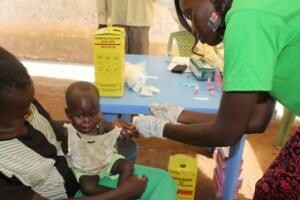The World Health Organization on Wednesday endorsed the RTS,S/AS01 malaria vaccine, the first against the mosquito-borne disease that kills more than 400,000 people a year, mostly children in Africa.
The decision followed a review of a pilot program deployed since 2019 in Ghana, Kenya, and Malawi in which more than two million doses were given of the vaccine, first made by the pharmaceutical company GSK in 1987.
After reviewing evidence from those countries, the WHO said it was "recommending the broad use of the world's first malaria vaccine", the agency's director-general Tedros Adhanom Ghebreyesus said.
The WHO said it was recommending children in sub-Saharan Africa and in other regions with moderate to high malaria transmission get four doses up to the age of two.
According to WHO, more than half of malaria deaths worldwide are in six sub-Saharan African countries and almost a quarter are in Nigeria alone, according to 2019 figures.
The vaccine which has been in development for nearly 40 years, and which is to be administered as four doses from five months of age, consists of part of a protein from the parasite bound to part of a second protein, from the hepatitis B virus, which helps immune cells recognize the substance.
Trials have shown that using the vaccine leads to a 30 percent fall in cases of severe or deadly malaria even in areas where bed nets are widely used, WHO said.
According to media reports, the Gavi vaccine alliance said in a statement after the WHO announcement that "global stakeholders, including Gavi, will consider whether and how to finance a new malaria vaccination program for countries in sub-Saharan Africa."
The Malaria Consortium in South Sudan says approximately 95% of South Sudan is endemic of malaria, with high transmission in the country throughout the year. This means there are currently 2,300,000 people at risk of malaria across the country. Malaria accounts for 20-40% of all health facility visits, 30% of all hospital admissions, and is a leading cause of illness and death in children under five years.




